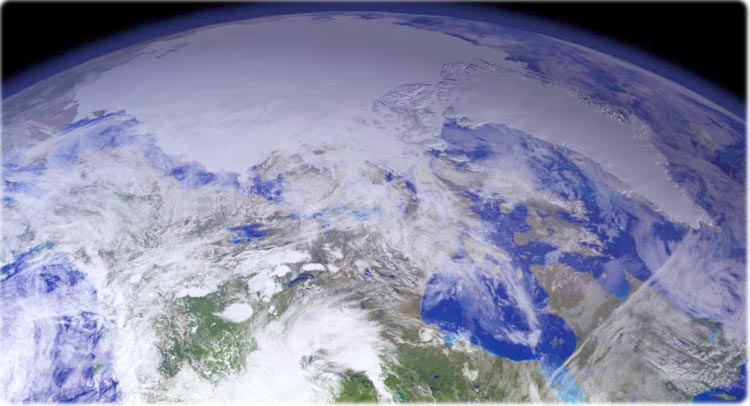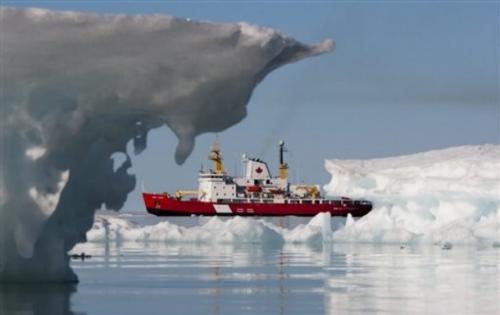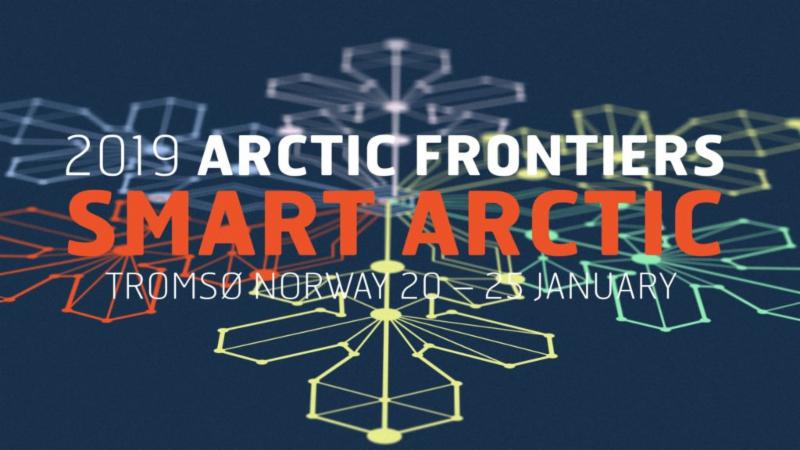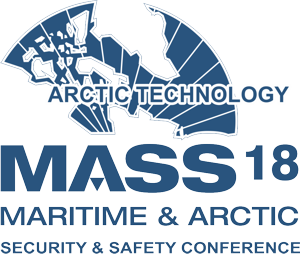|
|
|
|
|
|
|
|
Arctic Science Ministerial, October 25-26 (Berlin, Germany). On 25 and 26 October, science ministers, researchers and representatives of international organizations and Arctic Indigenous peoples will come together in Berlin to discuss the future course of Arctic research. A Science Forum took place on the first day of the conference. A Ministerial Meeting will take place on October 26 with the aim of producing a Joint Statement on international collaboration in the Arctic. The interim report of the Second Arctic Science Ministerial (ASM2) is now available for download at the ASM2 website. Please click here to download.
Arctic Science Forum Associated with the 2nd Arctic Science Ministerial, October 25, 2018 (Berlin, Germany and via webcast). How vulnerable and how resilient are nature and the people of the Arctic region? How well do we understand the regional and global dynamics which are driving change in the Arctic? What impact will change in the Arctic have on us? These and other questions are the focus of this two-day conference. It will take interdisciplinary research in the Arctic to gain an understanding of past and future processes - a complex and cost-intensive venture. This makes an international network of Arctic research so important for delivering better results. Cooperation in research, the exchange of data, collaborative observation and monitoring schemes - international cooperation is imperative in research on the Arctic.
|
Media
A Solar Project in Rural Alaska Takes Aim at Sky-High Electric Bills. A new renewable energy project in the Northwest Alaska village of Buckland aims to demonstrate solar and wind power's potential to reduce the region's sky-high utility costs. The village-run electric utility is set to switch on three new solar arrays this week, and a new battery system next year. Boosters say systems like Buckland's have huge potential to reduce the cost of power in rural Alaska, where electricity prices can be six times the national average and monthly light bills can top $1,000. But major obstacles remain, too, from the technology's cost to the region's remoteness. KTOO
 White House Appoints OSU- Cascades Researcher to Arctic Conference. White House Appoints OSU- Cascades Researcher to Arctic Conference. Elizabeth Marino, a social scientist at Oregon State University-Cascades, has been appointed by the White House Office of Science and Technology Policy as a delegate to the Second Arctic Science Ministerial, an international meeting in Berlin... Marino is one of 10 scientists and the only social scientist on the United States delegation to the ministerial. Her contributions will focus on the role of risk distribution and risk perception in strategic planning for sea level rise. KTVZ
Changes in Snow Coverage Threatens Biodiversity of Arctic Nature. Many of the plants inhabiting northern mountains depend on the snow cover lingering until late spring or summer. Snow provides shelter for plants from winter-time extreme events but at the same time it shortens the length of growing season, which prevents the establishment of more southern plants. This is why the reduced snow cover may be an even larger threat to the Arctic plants than rising temperatures. In a study published in the renowned scientific journal Nature Climate Change, researchers from the University of Helsinki and the Finnish Environment Institute analyzed how projected changes in temperature and snow cover duration will affect the risk for extinction in northern flora. EurekAlert!
 Canadian Coast Guard to Increase Focus on Arctic Through Creation of New Branch. Canadian Coast Guard to Increase Focus on Arctic Through Creation of New Branch. The federal Liberal government is turning its face to the North with changes in a major ministry and at the Canadian Coast Guard. "It is definitely a step toward a northern strategy," Fisheries and Oceans Minister Jonathan Wilkinson said Wednesday in Iqaluit, Nunavut. "This is a pretty significant step forward." Canada's National Observer
Arctic Climate Research Mostly Takes Place Near Just Two Locations. Why? The Arctic is a hotbed of climate change research and a vast and varied place, much of it remote and difficult to reach. That may explain why nearly one-third of study citations focusing on Arctic research were based on data collected within 50 kilometers, about 31 miles, of just two locations: Toolik Lake in Alaska and Abisko in Sweden. Yale Climate Connections
Trump Administration Approves First Oil Production in Federal Arctic Waters. Three years after Shell abandoned its oil exploration program in the Chukchi Sea, and with much less fanfare and controversy, another company has taken a big step toward being the first to produce oil from federal Arctic waters. The Trump administration today handed a key approval to the Texas-based Hilcorp for a proposed oil development in the Beaufort Sea, east of Prudhoe Bay. Alaska Public Radio
|
|
Future Events
aim of this Government of Canada and the Government of Newfoundland and Labrador supported international conference is to promote stakeholder collaboration, technological innovation, harsh environment research & development, and world-class education efforts that are contributing to both Maritime and Arctic issues. This two day conference will draw a diverse group of speakers and attendees representing government, military, Canadian and U.S. Coast Guard, industry, academic leaders, Northern Leaders, research and other key stakeholders. We hope you can join us to be a part of this important dialogue
American Geophysical Union Fall meeting, December 10-14, 2018 (Washington, DC USA). The AGU 2018 Fall Meeting will mark another dynamic year of discovery in Earth and space science, serve as the advent of AGU's Centennial year, and provide a special opportunity to share our science with world  leaders in Washington, D.C. As the largest Earth and space science gathering in the world, the Fall Meeting places you in the center of a global community of scientists drawn from myriad fields of study whose work protects the health and welfare of people worldwide, spurs innovation, and informs decisions that are critical to the sustainability of the Earth.
ArcticNet: Annual Scientific Meeting 2018, December 10-14, 2018 (Ottawa, ON Canada). Canada's North is experiencing unprecedented change in its sea and terrestrial ice, permafrost and ecosystems under the triple pressures of climate change, industrialization and modernization. The impacts of these pressures can be seen on food and energy security, shipping, sovereignty, northern community health and well-being, and sustainable development and resource exploitation. All these issues have brought the North to the forefront of national and international agendas. Building on the success of its previous Annual Scientific Meetings and International Arctic Change Conferences, the Arctic Network of Centers of Excellence announces the 14th ArcticNet Annual Scientific Meeting.
 Arctic Frontiers, January 20-25, 2019 (Tromso, Norway). The Arctic Frontiers is a global scientific conference on economic, societal, and environmental sustainable growth. This year's theme will be "Smart Arctic," with a pan-arctic emphasis, and an effort to build new partnerships across nations, generations and ethnic groups. Arctic Frontiers provides a forum for dialogue and communication between science, government and industry. The plenary program will have five main sessions: State of the Arctic, Blue Growth, Smart Solutions, Bridging the Gap, and Arctic business prospects. An abstract-driven science program will address Plastics in the Ocean, the Future of Governance and Handling Vulnerability in Arctic Ecosystems, State of the Arctic and A Smart Arctic Future.
 of the AAG includes over 8,500 geographers converging from the U.S., Canada, and nearly 60 other countries in a typical year including geographers, GIS specialists, environmental scientists, and other leaders for the latest in research and applications in geography, sustainability, and GIScience. of the AAG includes over 8,500 geographers converging from the U.S., Canada, and nearly 60 other countries in a typical year including geographers, GIS specialists, environmental scientists, and other leaders for the latest in research and applications in geography, sustainability, and GIScience.
|
|

  
4350 N. Fairfax Drive, Suite 510
Arlington, VA 22203, USA
External links in this publication, and on the USARC's World Wide Web site ( www.arctic.gov) do not constitute endorsement by the US Arctic Research Commission of external Web sites or the information, products or services contained therein. For other than authorized activities, the USARC does not exercise any editorial control over the information you may find at these locations. These links are provided consistent with the stated purpose of this newsletter and the USARC Web site.
|
|
|
|
|
|
|
|
|
 White House Appoints OSU- Cascades Researcher to Arctic Conference. Elizabeth Marino, a social scientist at Oregon State University-Cascades, has been appointed by the White House Office of Science and Technology Policy as a delegate to the Second Arctic Science Ministerial, an international meeting in Berlin... Marino is one of 10 scientists and the only social scientist on the United States delegation to the ministerial. Her contributions will focus on the role of risk distribution and risk perception in strategic planning for sea level rise. KTVZ
White House Appoints OSU- Cascades Researcher to Arctic Conference. Elizabeth Marino, a social scientist at Oregon State University-Cascades, has been appointed by the White House Office of Science and Technology Policy as a delegate to the Second Arctic Science Ministerial, an international meeting in Berlin... Marino is one of 10 scientists and the only social scientist on the United States delegation to the ministerial. Her contributions will focus on the role of risk distribution and risk perception in strategic planning for sea level rise. KTVZ Canadian Coast Guard to Increase Focus on Arctic Through Creation of New Branch. The federal Liberal government is turning its face to the North with changes in a major ministry and at the Canadian Coast Guard. "It is definitely a step toward a northern strategy," Fisheries and Oceans Minister Jonathan Wilkinson said Wednesday in Iqaluit, Nunavut. "This is a pretty significant step forward." Canada's National Observer
Canadian Coast Guard to Increase Focus on Arctic Through Creation of New Branch. The federal Liberal government is turning its face to the North with changes in a major ministry and at the Canadian Coast Guard. "It is definitely a step toward a northern strategy," Fisheries and Oceans Minister Jonathan Wilkinson said Wednesday in Iqaluit, Nunavut. "This is a pretty significant step forward." Canada's National Observer
 must-attend event to gain a wide perspective on challenges, opportunities and policies related to the Arctic and North Atlantic maritime environments. The
must-attend event to gain a wide perspective on challenges, opportunities and policies related to the Arctic and North Atlantic maritime environments. The 
